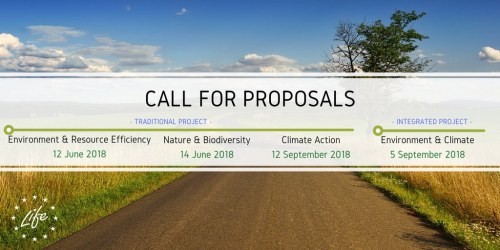The European Commission LIFE programme has launched its 2018 call for project proposals and is sending the following message to Ecsite's members:
This year, we are investing close to €400 million in nature conservation, environmental protection and climate action. We are also introducing a streamlined application process to make it easier for you to request LIFE funds.
As a bottom-up funding instrument, LIFE provides applicants with flexibility to truly innovate. We support projects that are either tackling climate change, or protecting nature and the environment. Further funding categories are tailored to the scale and objective of projects, but their approach, duration, consortium and budget remain up to you to decide.
Types of projects: Traditional and Integrated
Most LIFE projects are so-called Traditional Projects that can be coordinated by any legal entity registered in the EU, including public institutions, businesses and non-governmental organisations. Many traditional projects demonstrate best-practices, run pilots, raise public awareness or spread breakthroughs in environmental practices.
Since 2014, the LIFE programme also accepts applications for larger-scale Integrated Projects, which implement strategic EU plans on the environment and the climate on a large territorial scale. These projects can also have regional, multi-regional, national or trans-national scope. Integrated Projects are open to public administrations or other entities large enough to coordinate complementary funding from private, national or other EU sources. Examples of Integrated Projects are available in LIFE’s recent IP factsheet.
Simple new application process
As of this year, the LIFE programme has simplified its application process for traditional projects on Environment and Resource Efficiency, and Nature and Biodiversity. In this new, two-stage application procedure, candidates will outline their idea in a concept note by mid-June. Shortlisted candidates will then submit a full project proposal in autumn 2018. The LIFE programme has introduced this new approach to lighten your workload. This year, applicants for Traditional Projects on climate action will continue to submit single-stage applications by September 2018.
Key deadlines:
- 12 June 2018: concept notes for Environment & Resource Efficiency
- 14 June 2018: concept notes for Nature & Biodiversity
- 05 September 2018: concept notes for Integrated Projects
- 12 September 2018: full proposals for Climate Action
- October 2018 : notification for applicants, shortlisted applicants invited to submit full proposal
- End of January 2019 : deadline to submit full proposal
- 14 March 2019: full proposals for Integrated Projects
Checklists & guidelines
Applicants for funds will notably score higher if they address thematic priorities such as removing water pollutants through natural retention areas, developing better ways of sorting and recycling plastics, or measures backing the EU Emissions Trading System. The full list of thematic priorities is available in our Guidelines for Applicants for LIFE Environment and Resource Efficiency and Climate Action.
Overall, the LIFE programme is also interested in promoting projects whose results are sustainable, transferable and clearly offer EU added value. Our assessment criteria are listed in the evaluation guide contained in LIFE’s application packs for Traditional and Integrated Projects.
Among other criteria, we assess the technical coherence and quality of projects on the basis of how likely results are to outlast our funding. Dissemination activities should go beyond simply raising awareness of project results, replicating them ideally in broader contexts. Projects should also demonstrate a quantifiable environmental impact.
For further details, make sure to read our 2018 Guidelines for Applicants to Traditional and Integrated Project, contact your national contact point or stream the event live from our website.

